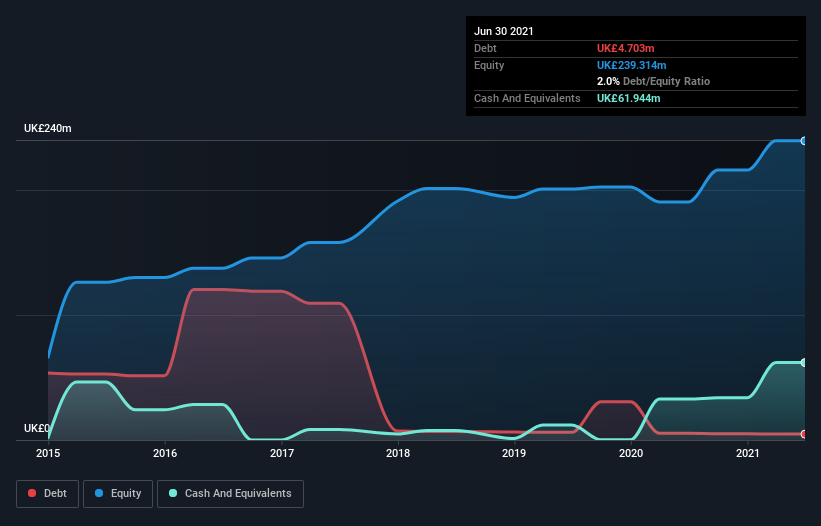Is Marshall Motor Holdings (LON:MMH) Using Too Much Debt?
The external fund manager backed by Berkshire Hathaway's Charlie Munger, Li Lu, makes no bones about it when he says 'The biggest investment risk is not the volatility of prices, but whether you will suffer a permanent loss of capital.' So it might be obvious that you need to consider debt, when you think about how risky any given stock is, because too much debt can sink a company. We note that Marshall Motor Holdings plc (LON:MMH) does have debt on its balance sheet. But should shareholders be worried about its use of debt?
When Is Debt Dangerous?
Debt is a tool to help businesses grow, but if a business is incapable of paying off its lenders, then it exists at their mercy. Part and parcel of capitalism is the process of 'creative destruction' where failed businesses are mercilessly liquidated by their bankers. While that is not too common, we often do see indebted companies permanently diluting shareholders because lenders force them to raise capital at a distressed price. Having said that, the most common situation is where a company manages its debt reasonably well - and to its own advantage. The first thing to do when considering how much debt a business uses is to look at its cash and debt together.
See our latest analysis for Marshall Motor Holdings
What Is Marshall Motor Holdings's Net Debt?
The image below, which you can click on for greater detail, shows that Marshall Motor Holdings had debt of UK£4.70m at the end of June 2021, a reduction from UK£5.34m over a year. But it also has UK£61.9m in cash to offset that, meaning it has UK£57.2m net cash.
A Look At Marshall Motor Holdings' Liabilities
According to the last reported balance sheet, Marshall Motor Holdings had liabilities of UK£492.4m due within 12 months, and liabilities of UK£124.0m due beyond 12 months. Offsetting these obligations, it had cash of UK£61.9m as well as receivables valued at UK£98.7m due within 12 months. So it has liabilities totalling UK£455.8m more than its cash and near-term receivables, combined.
This deficit casts a shadow over the UK£164.3m company, like a colossus towering over mere mortals. So we'd watch its balance sheet closely, without a doubt. After all, Marshall Motor Holdings would likely require a major re-capitalisation if it had to pay its creditors today. Marshall Motor Holdings boasts net cash, so it's fair to say it does not have a heavy debt load, even if it does have very significant liabilities, in total. When analysing debt levels, the balance sheet is the obvious place to start. But it is future earnings, more than anything, that will determine Marshall Motor Holdings's ability to maintain a healthy balance sheet going forward. So if you're focused on the future you can check out this free report showing analyst profit forecasts.
Over 12 months, Marshall Motor Holdings reported revenue of UK£2.6b, which is a gain of 30%, although it did not report any earnings before interest and tax. Shareholders probably have their fingers crossed that it can grow its way to profits.
So How Risky Is Marshall Motor Holdings?
While Marshall Motor Holdings lost money on an earnings before interest and tax (EBIT) level, it actually booked a paper profit of UK£50m. So taking that on face value, and considering the cash, we don't think its very risky in the near term. One positive was the revenue growth of 30% over the last year. But we genuinely do think the balance sheet is a risky. When analysing debt levels, the balance sheet is the obvious place to start. However, not all investment risk resides within the balance sheet - far from it. Be aware that Marshall Motor Holdings is showing 3 warning signs in our investment analysis , and 1 of those makes us a bit uncomfortable...
If, after all that, you're more interested in a fast growing company with a rock-solid balance sheet, then check out our list of net cash growth stocks without delay.
This article by Simply Wall St is general in nature. We provide commentary based on historical data and analyst forecasts only using an unbiased methodology and our articles are not intended to be financial advice. It does not constitute a recommendation to buy or sell any stock, and does not take account of your objectives, or your financial situation. We aim to bring you long-term focused analysis driven by fundamental data. Note that our analysis may not factor in the latest price-sensitive company announcements or qualitative material. Simply Wall St has no position in any stocks mentioned.
Have feedback on this article? Concerned about the content? Get in touch with us directly. Alternatively, email editorial-team (at) simplywallst.com.

